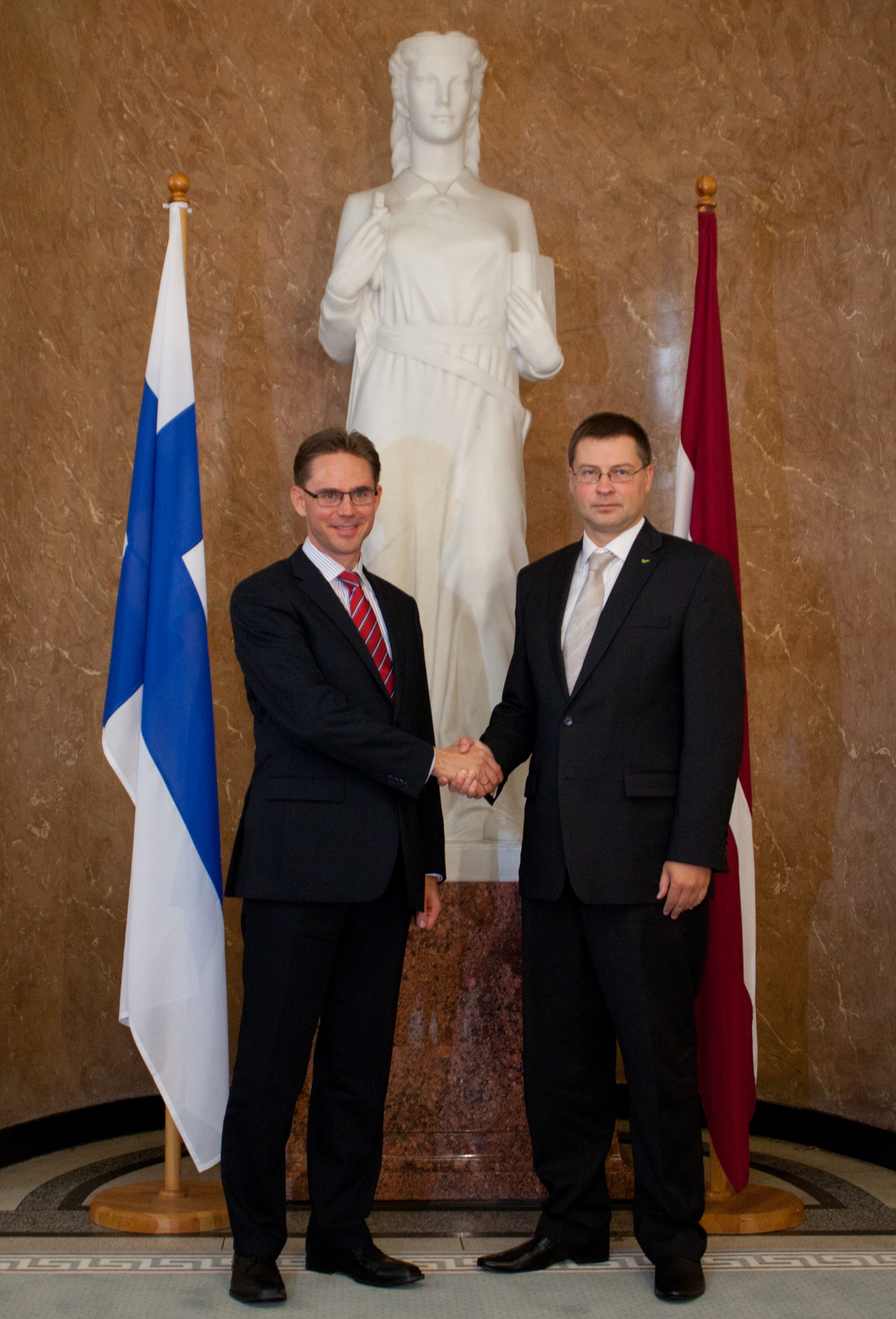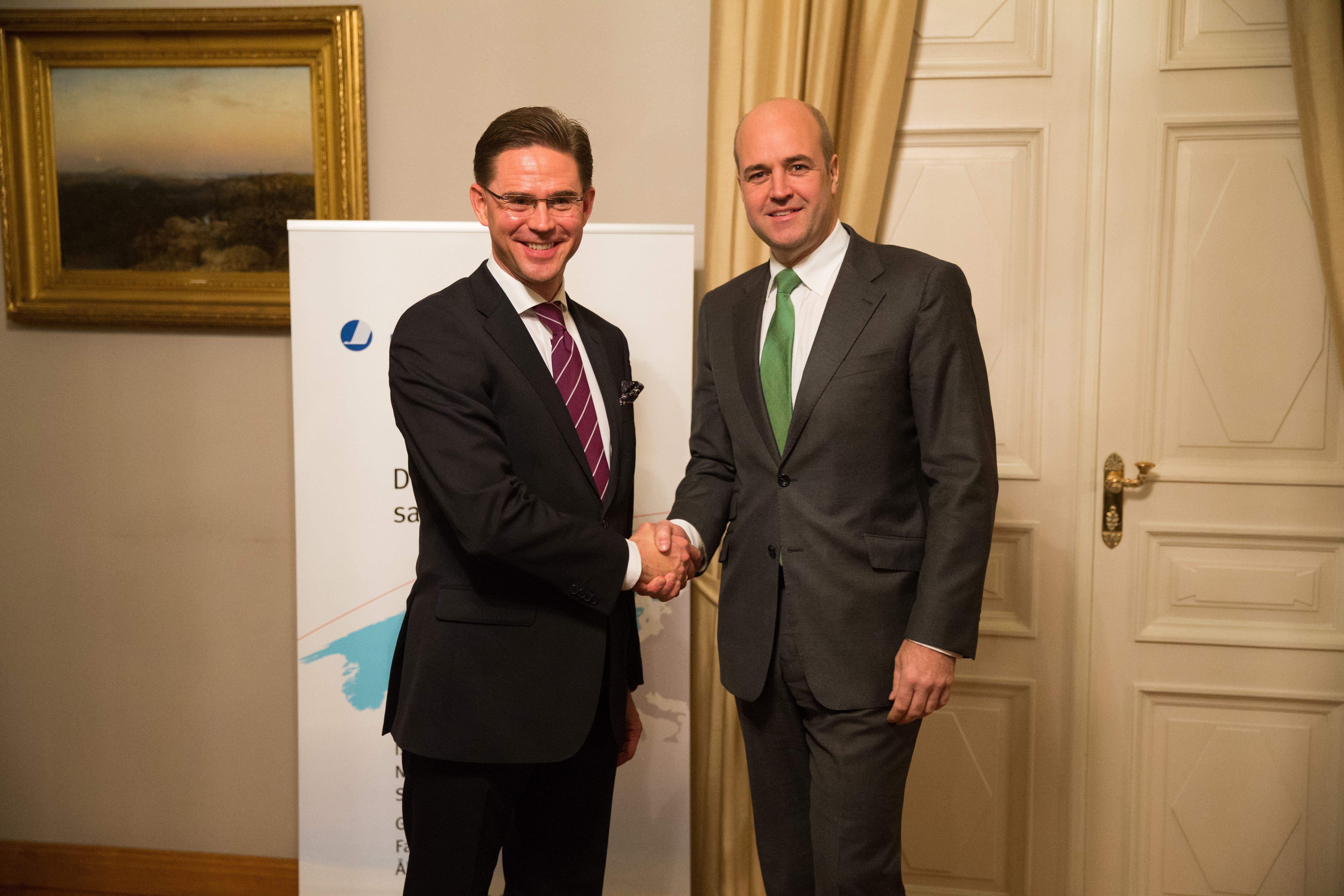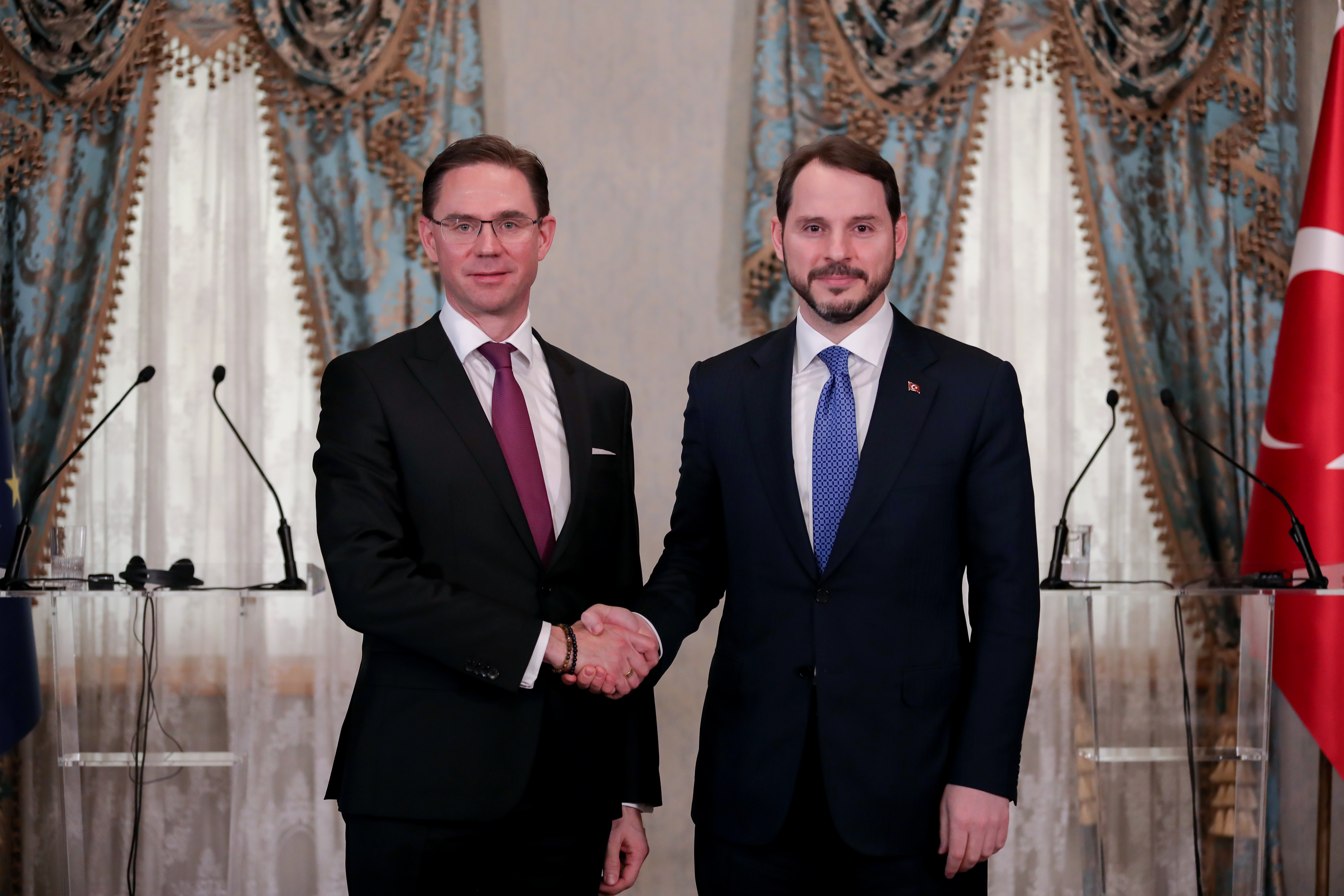1. Early Life and Background
Jyrki Katainen's early life and educational journey laid the foundation for his later political career, which began with local government service.
1.1. Early Life and Education
Katainen was born in Siilinjärvi, Finland, on 14 October 1971. He completed his secondary education at Siilinjärvi Senior High School, graduating in 1990. He then pursued higher education at the University of Tampere, where he earned a Master's degree in political science. During his university studies, he also spent a year as an Erasmus exchange student at the University of Leicester in the United Kingdom.
1.2. Early Activities
Before embarking on his political career, Katainen briefly worked as a part-time teacher. His first foray into public service came in 1993 when he was elected as a member of the Siilinjärvi municipal council, marking the beginning of his engagement in local governance.
2. Political Career
Katainen's political career progressed from local government to national leadership, culminating in his tenure as Prime Minister and his significant roles within the European Union.
2.1. Early Political Career
Katainen's early political career saw him rise through the ranks of the National Coalition Party and gain international experience. After serving on the Siilinjärvi municipal council, he was elected as a member of the Parliament of Finland (Eduskunta) in 1999, representing the district of Northern Savonia. Within his party, he served as vice-chairman from 2001 before becoming the party leader in 2004, a position he held for a decade until 2014. Internationally, he was the vice-president of the Youth of the European Peoples Party from 1990 to 2000. He further extended his influence in European politics by being elected vice-president of the European People's Party (EPP) for a three-year term in 2006, and was re-elected in 2009.
2.2. Minister of Finance and Deputy Prime Minister
In the 2007 Finnish parliamentary election, Katainen's National Coalition Party secured the second-largest number of seats. This led to the formation of a new four-party coalition government, including the Center Party, the National Coalition Party, the Green League, and the Swedish People's Party of Finland. In this cabinet, Katainen was appointed Minister of Finance and Deputy Prime Minister, serving from 2007 to 2011.
During his tenure, Katainen gained international recognition for his handling of Finland's economy amidst the global financial crisis. In November 2008, the Financial Times notably recognized him as Europe's best finance minister for his performance in managing policy and market stability. Reflecting on the economic challenges, Katainen emphasized the need for "painful things" in the coming years, acknowledging the political difficulty but asserting their necessity for economic recovery. This stance highlighted his commitment to fiscal discipline and structural adjustments, which would become a hallmark of his approach to economic governance.
2.3. Prime Minister of Finland (2011-2014)


Following the 2011 Finnish parliamentary election held on 17 April 2011, the National Coalition Party, led by Katainen, became the largest party in Finland for the first time in the country's history. This outcome paved the way for Katainen to assume the premiership. After extensive government-forming negotiations that lasted over two months, Katainen was elected Prime Minister by the Finnish Parliament and formally assumed office on 22 June 2011. His government was a broad six-party coalition, comprising the National Coalition Party, the Social Democratic Party of Finland, the Left Alliance (Finland), the Green League, the Swedish People's Party of Finland, and the Christian Democrats (Finland). The government was formally appointed by President Tarja Halonen.
His premiership was largely defined by efforts to stabilize Finland's economy in the wake of the global financial crisis and the ongoing Eurozone debt crisis. Katainen's administration sought to implement significant structural reforms, though these efforts often faced political hurdles due to the diverse ideological positions within his six-party coalition.
2.3.1. Major Policies and Reforms
During his premiership, Katainen's government pursued various economic policies and structural reform attempts aimed at improving Finland's economic outlook. In August 2013, he convened a forum at the Heureka science center, inviting representatives from political parties, interest groups, and research institutes. The forum's objective was to explore comprehensive structural changes necessary to enhance Finland's economy. Katainen expressed optimism that the discussions would provide a strong foundation for addressing difficult situations, emphasizing the need for immediate action on structural reforms.
Despite these efforts, the implementation of reforms was frequently delayed, particularly due to opposition from the socialist parties within his cabinet. In September 2013, the six-party government did outline plans for reform, but Katainen cautioned that these measures were still insufficient to fully address the country's economic challenges. A notable policy decision occurred in November 2012 when the government opted not to join the group of EU countries proposing a financial transaction tax. This decision was reportedly a contentious issue within the six-party coalition, as three of the constituent parties favored the tax, highlighting the internal political complexities of his government.
2.3.2. Economic Crisis Response and Investment Attraction
Katainen's government actively worked to stabilize Finland's economy during the global financial and Eurozone debt crises. He encouraged foreign investment in Finland, leveraging the country's highly regarded education system and political stability as key selling points. He also advocated for greater involvement of universities and higher education institutions in civil society to boost Finland's national competitiveness.
In a blog post in November 2013, Katainen expressed hope for Finland's economic future, citing significant foreign investments such as Google's approximately 800.00 M EUR investment in Hamina, Russian data center Yandex's investment in Mäntsälä, and Microsoft's plans to invest around 250.00 M EUR in Finland. However, he also acknowledged the persistent challenge that Finland was still experiencing more job losses than job creation. He reiterated that Finland needed more direct foreign investment to accelerate economic growth and increase employment, emphasizing the ICT sector, including data centers, as a core area for the national investment attraction strategy approved by his government in December of the previous year.
2.3.3. Relations with the European Union
As Prime Minister, Katainen played an active role in shaping Finland's stance on European Union integration and Eurozone stabilization. He urged European leaders to rebuild the unity of the European Union, which he believed had been undermined by the Eurozone debt crisis. Speaking at a Reuters Euro Zone Summit in February 2014, he highlighted that mutual resentment between citizens of northern creditor states and poorer debtor countries could fuel euroscepticism, potentially threatening the bloc's unity.
Katainen acknowledged that calls for greater European involvement were unpopular at a time when globalization had made people fearful of job losses and declining living standards. He believed that the enforcement of overhauled budget discipline rules and the creation of a banking union, featuring a single supervisor and a mechanism to resolve failed banks without burdening taxpayers, had achieved the main changes necessary to stabilize the Eurozone. Regarding potential changes to the EU treaty after the European Parliament elections in May 2014, Katainen identified himself as a pragmatist, suggesting that most of Europe's needs could be met by strengthening and expanding its internal market. He also asserted that key reforms to pensions, labor markets, and education, essential for European countries to remain competitive globally and maintain affordable social models, were primarily the responsibility of national governments.
Katainen also advocated for a single market in clean technology, noting that Finland's production of third-generation non-food biofuels faced barriers to entry in some EU countries due to outdated regulations. To counter euroscepticism in the pan-European election, he advised EU leaders to address issues important to voters who supported populist political parties.
Regarding the situation in Ukraine in early 2014, Katainen stated that Finland was not prepared to enforce economic sanctions against Russia, citing potential negative impacts on the Finnish economy. He recommended that leaders and citizens maintain a level-headed approach concerning the situation in Crimea. This position reflected a pragmatic approach, balancing international political pressures with domestic economic considerations.
3. Role in the European Union (Post-Prime Minister)
After his tenure as Prime Minister, Jyrki Katainen transitioned to a prominent role within the European Union, focusing on economic development and competitiveness.
3.1. Vice-President of the European Commission

Katainen resigned as chairman of Finland's National Coalition Party and as Finnish Prime Minister in June 2014. He was subsequently elected as a European Commissioner on 16 July 2014. He was later confirmed as the Vice-President-designate for Jobs, Growth, Investment and Competitiveness in the European Commission. In this role, his responsibilities included formulating recommendations to ensure member states' economies were on a path of sustainable growth and job creation, supervising the Union's common currency (the euro), and producing the Commission's regular economic forecasts and indicators.
Swedish social democrat Marita Ulvskog noted Katainen's strength derived from his Nordic background, which, in her view, enabled him to understand the importance of strong social partners in the labor market. She emphasized that the Euro crisis could not be resolved without social dialogue, a concept she believed Katainen understood well.
3.2. Key Initiatives and Policies
As Vice-President, Katainen was tasked with a significant initiative: finding 300.00 B EUR to invest in the growth and economy of the European Union. In a 2015 interview, he articulated his vision by stating that "investment is truly a golden thread that weaves together everything that we do - we need to invest in our people, in our partnerships and in our planet." This comprehensive approach meant not only "giving people the skills they need for the 21st century economy" but also promoting "mobility inside and outside the union, in a way that supports economic growth and social cohesion, protects against external threats and contributes to international development."
Ahead of the 2019 European Parliament election, Katainen was considered a potential spitzenkandidat for the European People's Party. However, in June 2018, he announced his decision not to seek the candidacy and instead stated his intention to leave politics after the conclusion of his term in the Commission.
4. Life After Politics
After stepping down from his role in the European Commission and leaving active politics, Jyrki Katainen took on new leadership positions in the public and private sectors.
In May 2019, Katainen was appointed president of SITRA, the Finnish Innovation Fund, for a five-year term, with his appointment formally announced in September 2019. More recently, in June 2023, he was named the head of the public affairs unit for the financial group Nordea, one of the largest financial services groups in the Nordic region.
5. Other Activities
Beyond his primary political and post-political roles, Jyrki Katainen has participated in several other significant external activities. He served as an Ex-Officio Member of the Board of Governors of the European Bank for Reconstruction and Development (EBRD) during two distinct periods: from 2007 to 2011, and again from 2014 onwards. This involvement highlights his continued engagement in international economic development and financial governance.
6. Personal Life
Jyrki Katainen is married to Mervi Katainen. They have two daughters, Saara, born in 2005, and Veera, born in 2009. In addition to his native Finnish, Katainen is multilingual, speaking English, French, and Swedish. He is also known to be an accomplished chef, reflecting a personal interest outside his public life.
7. Assessment and Impact
Jyrki Katainen's political and economic activities have had a notable impact on Finnish and European society, drawing various assessments and criticisms within historical and social contexts. As a leader from the center-right National Coalition Party, his policies often prioritized fiscal discipline, structural reforms, and economic competitiveness.
During his tenure as Minister of Finance, Katainen was lauded by the Financial Times for his management of Finland's economy during the 2007-2010 financial crisis. His emphasis on "painful things" for economic recovery signaled a commitment to austerity measures, which, while aimed at stabilizing the economy, could have had social implications through cuts or reforms affecting public services and social welfare. From a center-left perspective, the long-term social impact of such measures, particularly on vulnerable populations and income inequality, warrants critical examination.
As Prime Minister, Katainen's efforts to implement structural reforms faced significant political resistance, particularly from the socialist parties within his six-party coalition. This internal friction highlights the democratic challenges of achieving consensus on policies that may have broad social consequences. His warning that the reforms were "not sufficient" could be interpreted as a desire for deeper market liberalization, which might raise concerns about the balance between economic efficiency and social equity. The decision not to join the financial transaction tax initiative, despite internal party divisions, underscores a preference for maintaining economic competitiveness over increased financial regulation, a stance often criticized by those advocating for greater financial sector accountability and social funding.
His focus on attracting foreign investment, while contributing to economic activity, needs to be assessed in terms of its actual impact on job creation versus job losses, and whether these investments translated into broadly shared prosperity or primarily benefited specific sectors. The controversy surrounding his views on the decline of Nokia, a company deeply embedded in Finland's national fabric, illustrates the complex interplay between economic policy, national identity, and social well-being.
In his role as Vice-President of the European Commission, Katainen championed investment and growth, framing it as a "golden thread" for people, partnerships, and the planet. While promoting skills for the 21st-century economy and mobility across the EU, the actual implementation of these initiatives requires scrutiny regarding their contribution to genuine social cohesion and human rights, ensuring that economic growth does not exacerbate social disparities or undermine labor protections. His pragmatic approach to EU integration, focusing on strengthening the internal market rather than treaty changes, reflects a cautious stance that may be seen as prioritizing economic efficiency over deeper political integration or social harmonization. Similarly, his position on not enforcing economic sanctions against Russia due to potential negative impacts on the Finnish economy, while pragmatic, raises questions about the balance between national economic interests and broader international human rights or geopolitical considerations.
Overall, Jyrki Katainen's career is characterized by a consistent focus on economic stability, competitiveness, and integration within the European framework. While achieving recognition for his economic management, a comprehensive assessment of his impact from a center-left perspective would critically examine the social costs and benefits of his policies, their influence on democratic processes through coalition dynamics, and their ultimate contribution to human rights and broader social progress in Finland and the European Union.